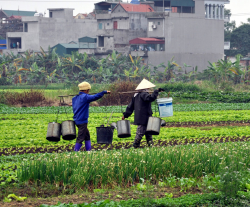Working with partners to mitigate global phosphorus vulnerabilities and adapt for a more secure food future.
A handful of countries control 85 per cent of the world’s finite phosphate rock – an essential element in growing our food. We work with partners to identify specific opportunities to alleviate this vulnerability by co-identifying context-specific opportunities to adapt for a more secure future.
The nature of phosphorus vulnerability is understudied, and ISF is a world leader in this area of enquiry. Our holistic long-term approach means that we consider the problem from multiple perspectives, taking in the potential social, economic, scientific and sustainability impacts of phosphorus scarcity.
In Sri Lanka, we analysed the links between climate change and phosphorus vulnerability to develop farm and policy interventions. This work enabled us to work with smallholder farmers and envision future pathways for their food systems.
Our global Phosphorus Futures project explored the links between clean waterways through improved phosphorus management in Australia, United States, Malawi, and Vietnam. We identified the major risks and intervention points to improve water systems and phosphorus recycling.
As part of a collaborative project for CSIRO’s National Research Flagships Program’s Flagship Collaboration Fund, ISF examined the implications of global phosphorus scarcity for the Australian food system.
A policy analysis and flows analysis of the Australian food production and consumption system through to food consumption and excretion identified opportunities for achieving phosphorus security in Australia.
In Malawi, Zambia, and Ethiopia we conducted a visioning workshop to identify barriers and enablers of organics value chains in rural African contexts. This work was supported by the Australia-Africa Universities Network.
PROJECT | 2023-2024
Phosphorus & Climate Smart Agriculture Network (PACSAN)
A unique knowledge-sharing project enabling Australia and China to strengthen both countries' food security in the face of climate change and phosphorus vulnerability.
PROJECT | 2022
UK Phosphorus Transformation Strategy
ISF researchers led the development of the nation's first comprehensive plan for managing a lynchpin of food production.
PROJECT | 2022
Our Phosphorus Future
ISF researcher Associate Professor Dr Dana Cordell contributes to a global synthesis of phosphorus management.
PROJECT | 2018-2021
From urban waste to sustainable value chains: linking sanitation and agriculture through innovative partnerships in Sri Lanka
This applied research project in Sri Lanka connects the waste management, sanitation and agriculture sectors through the circular economy, to improve food security and environmental health. This project is a partnership between ISF, the International Water Management Institute, Janathakshan Ltd, Sabaragamuwa University of Sri Lanka and the Sri Lankan Department of Agriculture.
View more projects
PROJECT | 2008-
Phosphorus: the missing ingredient for food security
ISF leads the world in understanding the crucial role of phosphorus in global food security.
PROJECT | 2015-
P-FUTURES
Transforming the way cities secure food and water through innovative phosphorus governance.
PROJECT | 2020-2023
Marie Curie Innovative Training Network for PhD students
Marie Curie Innovative Training Networks drive scientific excellence and innovation. They bring together universities, research institutes and other sectors from across the world to train researchers to doctorate level.
In 2020, ISF established a Marie Curie Innovative Training Network focused on sustainable phosphorus management in a model city, with a consortium of EU academic and non-academic partners. ISF trained and co-supervised a number of transdisciplinary and social-science phosphorus PhD research projects.
This addressed the strong need for social, economic and political science research addressing phosphorus sustainability, to complement the engineering, ecological and agronomic knowledge and expertise. ISF doctoral projects addressed themes such as: effective governance frameworks and policy instruments to support phosphorus recycling and use, creating demand for recycled phosphorus, cost-effectiveness of phosphorus recovery vs phosphate rock fertilisers from a life cycle perspective.
Client: EU Marie Curie ITN
Researchers: Dana Cordell, Brent Jacobs
PROJECT | 2017-2021
Enhancing food resilience in the UK
This project sought to enhance the resilience of the UK food system by accounting for catchment and socio-ecological heterogeneity in the sustainable management of phosphorus.
ISF hypothesised that the variable response of catchments to phosphorus inputs would define a region’s capacity to adopt sustainable phosphorus management practices, with knock-on consequences for the vulnerability of the UK food systems to phosphorus shocks caused by geopolitical pressures, rock phosphorus availability and price fluctuation.
Client: University of Leeds
Researchers: Dana Cordell, Brent Jacobs, Laure-Elise Ruoso, Federico Davila
PROJECT | 2016-2017
Food security, phosphorus scarcity and climate change in Sri Lanka
Two of the biggest global challenges for food security – phosphorus scarcity and climate change – are threatening farmers’ livelihoods, agricultural productivity and environmental integrity. Risks are particularly high in low-to-middle income Asia-Pacific countries, yet remain insufficiently assessed or mitigated. This project investigated the capacity of smallholder farmers and policy-makers in Sri Lanka to adapt to these twin challenges via development and testing of a novel rapid integrated vulnerability assessment framework.
Adoption of the framework by key stakeholders increased adaptive capacity, ultimately improving the livelihoods of small farming families, national food security, and environmental integrity of agricultural land and waterways.
Client: University of Technology Sydney
Researchers: Dana Cordell, Brent Jacobs, Jerastin Dubash
RESEARCH OUTPUTS
Towards phosphorus and climate smart agriculture (PACSA) in Sri Lanka (News article)
PROJECT | 2014
Towards urban food and water security: integrating sustainable phosphorus management in urban decision-making and planning
Global phosphorus scarcity and its implications for food security is emerging as one of the biggest global sustainability challenges this century. This is particularly relevant on an urban scale, as cities: 1) are ‘phosphorus hotspots’ – cities concentrate people, thus concentrating both the demand for food (which is high in phosphorus), and the generation of phosphorus-rich organic waste such as food, landscaping and sewage wastes, 2) As a consequence of 1, cities are key nodes of change for transforming phosphorus use in to closed loops – they are catalysts for greater change through their strong economic and political influence and are crucial centres for social-ecological-technological decision-making and innovation.
This project aimed to help cities to transformation phosphorus governance, taking into consideration the unique local context, synergies with other local sustainability goals, and global phosphorus security goals. Our objective was to co-develop a sustainable urban phosphorus framework together with four diverse partner cities in different continents (Hanoi, Sydney, Phoenix and Kumasi) to:
- undertake rapid urban phosphorus vulnerability assessments,
- identify impacted, influential, and under-represented stakeholders,
- develop desired and possible urban phosphorus future scenarios and broader implications, and
- guide transformation to resilient cities through co-development of priority adaptive strategies.
Client: "International Social Science Council, Future Earth"
Researchers: Stuart White, Dana Cordell, Juliet Willetts
PROJECT
Irish P-Change workshop
This workshop engaged stakeholders in Ireland to develop a 'Change Model' for Ireland's phosphorus value chain, based on the processes used for North America in 2015.
Clients: Queens University of Belfast, Irish EPA
Researchers: Dana Cordell, Brent Jacobs








